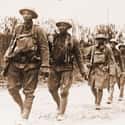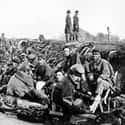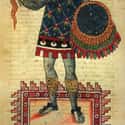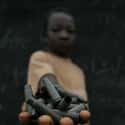-
(#10) In WWI, American Soldiers Were Given Cigarettes To Calm Their Nerves
Prior to 1917, when America entered WWI, smoking habit-forming cigarettes was considered something of an upper-crust activity. In fact, tobacco was primarily imbibed through pipes. As American soldiers were shipped off to the European front, however, they were issued hand-rolled options. The prevailing theory was that smoking would calm a soldier’s nerves before heading into battle. During the conflict, doctors gave them to wounded soldiers, telling them it would help with their discomfort.
They became standard issue for other national armies. In both Canada and England, nationwide fundraisers were held just to buy and send cigarettes to the troops during WWI. By the end of the conflict, Phillip Morris had headquarters in New York City and England. During this period, tobacco advertising exploded. Soldiers found cigs much less costly and much easier to use on the go, so they carried their habit home with them after the fighting was finished. Soldiers dependent on tobacco during WWI carried their habit into WWII, and governments followed suit, providing them in rations.
-
(#9) Many Civil War Vets Became Dependent On Hardcore Substances
The American Civil War was a dark point in American history. Most are aware that it was one of the costliest military events in the country’s history, thanks to the ingenuity of the modern age and its technology bashing headlong into the tactics of a bygone era. It was foolish to walk in formation, for example, when the enemy was equipped with a fully operational Gatling device.
Doctors were also behind the times. Field medics struggling to keep their charges comfortable ended up liberally administering morphine to the troops. Beyond battlefield ailments, it was given to troops to treat more or less everything, including diarrhea. In the Union Army, doctors issued more than 10 million doses of it during the conflict. To put that in context, 2.75 million soldiers fought for the Union. Historians estimate that at least 200,000 morphine addicts were created by 1900 as a result of the conflict.
-
(#5) In Vietnam, US Soldiers Were Fed A Cocktail Of Substances
A litany of movies and books have popularized the fact that the use of controlled substances and dependency was all too common among enlisted American troops in Vietnam. There were many drugs on offer to soldiers in Vietnam.
In order to increase the stamina, aggression, and longevity of soldiers fighting in terrifying conditions, military brass in Vietnam dispensed pep pills (speed), steroids, and more.
-
(#7) Zulu Warriors Took A Form Of Cannabis Before Battle
In the 1870s, the British army was considered the most elite fighting force in the world. As the tide of imperialism swept the globe, the Brits became a seasoned squad feared by all enemies - all except the Zulu people of Southern Africa, who responded to a request for submission from the British government by telling the Brits to take a hike.
This seemingly low-tech band of soldiers became immensely feared by the British army because they fought with an intensity that seemed otherworldly. Zulu warriors prepared for battle by sharing a communal meal and ingesting, at the behest of shamans, ceremonial alcohol and intelezi, an herb. They were then given a local form of cannabis called dagga. When ingested as a cannabis broth, dagga delivers all of the intoxicating effects of cannabis with none of the sedative properties.
Dagga emboldened Zulu warriors, and made their aggression during hand-to-hand combat hard to predict. The Zulu army was highly and efficiently organized, and their communal rituals and substance use helped reinforce their fraternal bonds, which in turn contributed to their success in battle.
-
(#6) Ancient Mayans May Have Carried Out Conflicts In The Name Of Tlaloc, The Mushroom God
Archaeologist Dr. Stephan F. de Borhegyi found evidence suggesting mushroom rituals were a focal point of Mayan religion. According to de Borhegyi, around the year 1000 BC, a group arose that appeared to worship mushrooms. The group associated mushrooms with various rituals, and some historians believe they carried out full-scale conflicts in the name Tlaloc, the god most commonly associated with mushrooms.
Tlaloc was most often depicted with bulging eyes, a handlebar mustache, and jaguar fangs, possibly because his depictions were made by devotees using psychedelic mushrooms. Borhegyi believed ancient Mayans kept this mushroom powder in jars and imbibed it through various means. Historical precedent for the theory of Mayan mushroom soldiers is found in the work of Fray Bernardino Sahagun, a Spanish writer who described Aztecs using mushrooms in a similar way.
-
(#4) Young Soldiers In West Africa Had Access To 'Brown Brown'
If you were to imagine the most harrowing existence possible, it'd be hard to imagine something worse than the fate of extreme young soldiers. Throughout the world, small squads of young boys - mostly orphans whose parents were slain in whichever conflict drew them in - are handed arms and told to fight for their country.
In the 11-year-long civil conflict in Sierra Leone that began in 1991, child soldiers were given a substance called "brown brown" to increase the intensity of their fighting and keep them loyal to whichever faction had them in their thrall. "Brown brown" is a potent mix of cocaine and gunpowder. Former child soldier Ishmael Beah wrote in The New York Times:
We [used cannabis] and sniffed "brown brown," which was always spread out on a table near the [arms] hut, and of course I took more of the white capsules, as I had become [dependent on] them. The first time I took all these [substances] at the same time, I began to perspire so much that I took off all my clothes. My body shook, my sight became blurred and I lost my hearing for several minutes. I walked around the village restlessly. But after several doses... all I felt was numbness to everything and so much energy that I couldn't sleep for weeks.
New Random Displays Display All By Ranking
About This Tool
Our data comes from Ranker, If you want to participate in the ranking of items displayed on this page, please click here.






